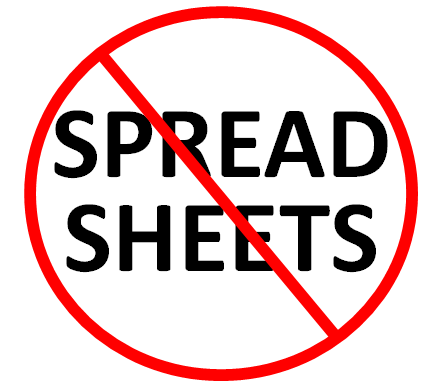Why spreadsheets are no good for QHSE compliance
I love spreadsheets – always have, in fact. I find them great for individual analysis and they have good data manipulation features.
But I also loathe spreadsheets – mainly because hardly a day goes by when I don’t encounter an organisation who is overusing/abusing them.
Due to their perceived versatility and ubiquity, spreadsheets are the de facto standard for many business functions – QHSE compliance included.
But as my online dictionary confirms, de facto certainly doesn’t mean best – its definition being: in fact, or in effect, whether by right or not.

The trouble with spreadsheets
When it comes to QHSE compliance, I’d go so far as to say that, far from best, spreadsheets are actually one of the worst tools. Here’s why:
Accuracy: spreadsheets are notorious breeding grounds for data inaccuracies because most users lack the knowledge or commitment to build in proper controls. A wrong keystroke and a formula is replaced with a static value and the calculation becomes meaningless.
Consistency: Maintaining data consistency within a single spreadsheet can be hard enough but ensuring consistency across spreadsheets is near-impossible. Without a whole library of business rules and/or conditional formatting, it’s just too easy for inconsistencies to creep in.
Versioning: Ensuring that everyone is always using the correct version of a spreadsheet requires a lot of unnecessary manual effort. And even with such rigorous controls in place, it only takes one individual to forget or ignore the rules to instigate the use of a redundant version.
Collaboration: Whilst team collaboration is key for QHSE compliance success, spreadsheets are simply not conducive to supporting a shared environment. This means that information sharing becomes a ridiculous game of email ping-pong and multiple versions of the same file being updated simultaneously.
Scalability: spreadsheets are only really intended to be used by one individual at a time - and doing analysis-type work. But as more data is added and more users require access, the issue of scalability inevitably rears its ugly head.
Visibility: most organisations typically have multiple spreadsheets in play trying to support their various compliance functions. This means that it is often necessary to look at more than one file to get the complete picture and keeping the files in synch requires manual intervention. Talk about inefficient!
Auditability: spreadsheets don’t support traceability and audit-trails because once a cell is overwritten, any prior history is immediately wiped.
Process: spreadsheets have no workflow capability so managing the various compliance processes needs to be done separately – and is therefore usually done manually using email.
The business-impact of spreadsheet-overuse
Companies often try to use spreadsheets for core compliance functions like risk analysis, training registers, audits & inspections and non-compliances, etc.
However, despite their familiarity and availability, spreadsheets tie organisations to inefficient processes and impede collaboration.
They also become a significant impediment to getting things done (aka business execution) and can significantly increase an organisation’s risk profile.
Spreadsheets impose a heavy (and often hidden) cost on the organisation with many confusing freely-available for cost-free. They result in poor productivity of staff – especially those at the heart of the compliance effort.
The takeaway
Back home in my shed, I’ve got some great tools – things like hammers and saws - but I don’t use a hammer for sawing and I don’t try to hit things with my saw (well only rarely!)
The point is that generic software applications – like spreadsheets - are great when used in context (and used correctly) but, like most things, they’re lousy when used beyond their ‘home territory’.
And when it comes to QHSE compliance - and your management system in particular – only the uneducated honestly believe that these tools are fit for purpose.
Whilst I have no doubt that spreadsheets will remain a force to be reckoned with for many years to come, there is now clear evidence that people are finally wising up to their limitations and overuse.
Look out for the next blog where I’ll discuss some much better alternatives.
.png?width=200&height=51&name=image%20(2).png)



